Platelets
Platelets, also known as thrombocytes, are small, colorless cell fragments found in the blood. They play a crucial role in the process of blood clotting or coagulation, which is essential for wound healing and preventing excessive bleeding.
Structure of Platelets
Platelets are irregularly shaped, small, and have no nucleus. They are derived from the fragmentation of larger cells called megakaryocytes in the bone marrow. The average lifespan of platelets is about 8-10 days.
Function of Platelets
Platelets have several important functions in the body:
- Blood Clotting: When a blood vessel is damaged, platelets rush to the site and form a plug to stop the bleeding. They release chemical signals to attract more platelets and other clotting factors, leading to the formation of a blood clot.
- Immune Response: Platelets also play a role in the body's immune response by releasing proteins that help fight infection and inflammation.
- Wound Healing: Platelets release growth factors that stimulate the repair and regeneration of damaged tissues.
Disorders Related to Platelets
Disorders associated with platelets include:
- Thrombocytopenia: A condition characterized by a low platelet count, which can lead to excessive bleeding and bruising.
- Thrombocythemia: An abnormal increase in platelet count, which can lead to blood clot formation and related complications.
Study Guide
Here are some key points to remember about platelets:
- Platelets are small cell fragments involved in blood clotting.
- They are derived from megakaryocytes in the bone marrow.
- Platelets play a crucial role in preventing excessive bleeding and promoting wound healing.
- Disorders related to platelets include thrombocytopenia and thrombocythemia.
Remember to review the functions and structure of platelets to gain a comprehensive understanding of their role in the body.
.◂Science Worksheets and Study Guides Sixth Grade. Moving and Controlling the Body
Worksheet/Answer key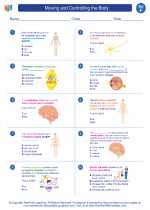 Moving and Controlling the Body
Moving and Controlling the Body  Worksheet/Answer key
Worksheet/Answer key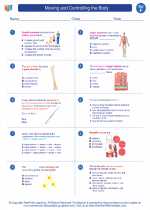 Moving and Controlling the Body
Moving and Controlling the Body  Worksheet/Answer key
Worksheet/Answer key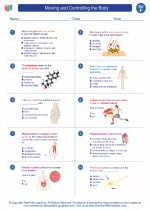 Moving and Controlling the Body
Moving and Controlling the Body  Vocabulary/Answer key
Vocabulary/Answer key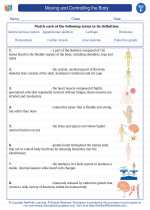 Moving and Controlling the Body
Moving and Controlling the Body  Vocabulary/Answer key
Vocabulary/Answer key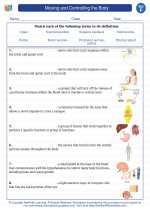 Moving and Controlling the Body
Moving and Controlling the Body  Vocabulary/Answer key
Vocabulary/Answer key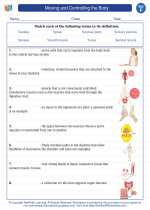 Moving and Controlling the Body
Moving and Controlling the Body 

 Worksheet/Answer key
Worksheet/Answer key
 Worksheet/Answer key
Worksheet/Answer key
 Vocabulary/Answer key
Vocabulary/Answer key
 Vocabulary/Answer key
Vocabulary/Answer key
 Vocabulary/Answer key
Vocabulary/Answer key

The resources above cover the following skills:
Reading Standards for Literacy in Science and Technical Subjects
Craft and Structure
Determine the meaning of symbols, key terms, and other domain-specific words and phrases as they are used in a specific scientific or technical context relevant to grades 6-8 texts and topics.
Writing Standards for Literacy in Science and Technical Subjects
Production and Distribution of Writing
Produce clear and coherent writing in which the development, organization, and style are appropriate to task, purpose, and audience.